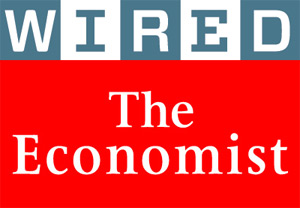
In recent issues of Wired and The Economist, the same quote was trotted out by both ‘zines to sum up a new debate on what to do with our financial institutions. The quote was dispensed by future Supreme Court justice Louis Brandeis in 1913 regarding his take on the economy a hundred years ago: “Sunlight is said to be the best of disinfectants. Electric lights the most efficient policemen.” In other words, if you expose the back-room mechanisms by which big deals are struck, the temptation to lie, cheat, and steal will be gone.
It became a maxim under FDR and has continued to inform our thinking right through the post-Enron, Sarbanes-Oxley present. However, as the headlines of the last year can tell you, our banks and businesses aren’t doing any better at avoiding disaster.
So what’s the solution? Radical Transparency! We need to see all of the numbers all of the time! Wired takes this a little leap further with an eye-lens focused through the filter of the Open-Source movement: Make the numbers such that anyone can understand and we will all become citizen-soldiers policing the commercial world through our wise and wily investment acumen. Surely, only the cream of the crop will rise to the top if we vote with our well-researched dollars.
The Economist wishes it were that simple, but alas, reality is pin-pricking the Hindenburg of Good Intentions.
First of all, financial data is opaque and ambiguous because it’s dense and confusing. This is why people with PhD’s who have studied the crap their entire lives come up with very different ideas about what to do with it. The lack of clarity in Company XYZ’s quarterly report isn’t usually a result of malicious intent, but rather the outcome of some poor sap being forced to spend a caffeine-drenched weekend in the office cranking out something that looks respectable when the data he’s dealing with is incomplete and borderline incomprehensible after being thrown together by some other department that just lost their planned getaway to the Hamptons to the need to crunch numbers that may or may not have been entered correctly by Jimmy in cubical 83. Good luck!
Secondly, We The People are really not to be trusted to make good financial decisions. Studies have shown that we don’t know what we’re doing. Better, clearer information does not lead to smarter decisions. We The People make our calls based on what’s worked in the past, how much risk we’re willing to tolerate, and our general emotional dispositions. And we don’t like math.
Thirdly, it’s not just the Enrons of the world that are causing the trouble. The current crisis is one of faulty (or perhaps misapplied) mathematics. The guy that wrote the formula on how to quantify the risk inherent in a big bag of bundled mortgages thought he was doing us a favor. And for ten years it seemed that he was. Then things kinda went downhill. (This is worthy of futher reading.)
However, despite the talking-headed raving and expert-opinioned ranting on the daily news, we are a long ways away from the mess of 1929 and transparency has much to do with that. How to take this further is a tricky task, but maybe we’re beginning to see the light.
